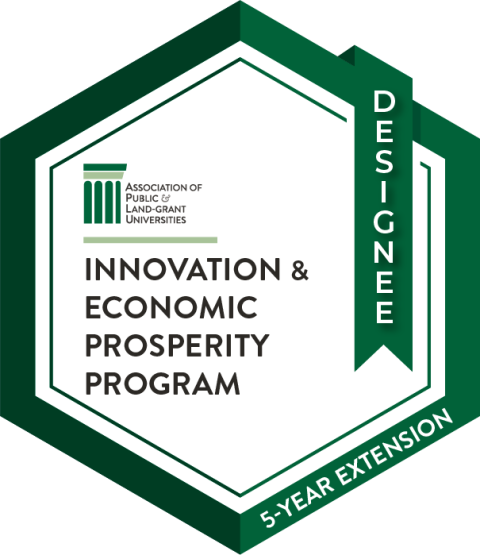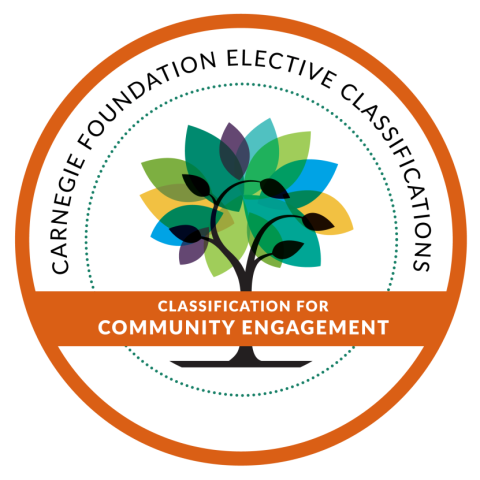The Office of Outreach and Engagement (OE) helps the public connect with the UNH community to improve the state’s economy and quality of life.
OE provides leadership, collaboration and support, to establish pathways to partnership for people, organizations and businesses seeking assistance, non-credit education or professional development. OE emphasizes public engagement and collaboration to address the state’s most pressing issues, such as workforce development and readiness, k-12 education, environmental sustainability and healthcare.
Initiatives

The Association of Public and Land-Grant Universities (APLU) Innovation and Economic Prosperity (IEP)
UNH Receives the APLU IEP 5-Year Extension.
In 2017, The University of New Hampshire was one of three universities to be awarded the IEP Designation from the APLU. The APLU’s IEP Universities program was developed to recognize institutions of higher education for their efforts in economic engagement. Economic engagement refers to university initiatives that promote innovation and entrepreneurship, excellence in technology transfer, and leadership in talent and workforce development.
The five-year extension designation reaffirms UNH's commitment to economic engagement, ensuring that our economic engagement enterprise is consistent with current conditions and goals.

Carnegie Community Engaged Institution
UNH Earns Carnegie Classification for Community Engagement
The University of New Hampshire has been chosen as one of 40 U.S. colleges and universities to receive the 2024 Carnegie Community Engagement Classification in recognition of its “institutional commitment to community engagement.”
The elective designation was announced by the American Council on Education (ACE) and the Carnegie Foundation for the Advancement of Teaching and is awarded following a process of self-study by each institution, which is then assessed by a national review committee.
“This recognition highlights our commitment to fostering meaningful partnerships with our local and global communities, and actively engaging in service learning, engaged scholarship and engaged research activities,” says Kenneth La Valley, vice provost of university outreach and engagement and director of UNH Extension
“Embrace New Hampshire” is one of the four strategic pillars UNH President James W. Dean, Jr. announced for the university community in 2019, with a focus on strengthening UNH’s standing as a trusted and valuable partner to the Granite State, and the community engagement classification represents tangible recognition in that area.
Learn More about the Carnegie Community Engaged Institution
K-12 Engagement Project
Every child deserves an education that allows the opportunity to achieve their dreams. UNH see the need for developing a "multiple pathways" approach that recognizes the diversity of student interests and abilities.
The multiple pathways approach addresses the President’s strategic priority: Embrace New Hampshire - by creating a K12 engagement strategy for the University that aims to expand opportunities by offering well-designed and coordinated activities and programs for young people. This approach will permit students to gravitate to programs that are personally relevant and hold the potential to improve and support progression to and successful participation in higher education.
Student success is dependent on highly-effective teachers. By supporting the ongoing learning of primary and secondary teachers through professional development, UNH can engrain itself deeply into our local communities.
The K-12 project resulted in the development of four main future goals:
- Increase Outreach and engagement visibility and coordination, internally and externally
- Increase parent, youth, and educator awareness of UNH K-12 initiatives and provide meaningful and relevant pathways for personal development
- Help educators improve their practice and connect them with resources at UNH
- Create a coordinated Discovery Hub
The Hub is expected to provide comprehensive and coordinated knowledge of the breadth of UNH outreach offerings in an accessible and highly personalized construct within an easily digestible site and format. The University-wide endeavor will promote relevant, pathway learning and encourage lifelong connections.
The UNH Discovery Hub project is in the final stages of development and has a high potential for making a significant local and statewide impact. We’ve identified objectives, audiences, and our vision for potential outcomes.
The Discovery Hub is an exciting project for UNH. We understand it will have an incremental implementation, but also know it has the potential for growth and inclusion from all areas of Outreach and Engagement. Intentional and thoughtful execution of the Hub project over the next few years will certainly allow UNH to better “Embrace New Hampshire.”
UNH Micro-credentials and Digital Badge Program
A college degree still looms large in hiring and it remains an important factor when assessing candidates. However, employers are also interested in candidates with detailed and easily accessible credentials that validate skills or competencies specific to their hiring needs. In response, UNH embraces the micro‐credential/digital badge as a means of both meeting workforce needs and supporting well‐rounded students with highly marketable skills.
UNH seeks to equip learners with accessible pathways for skill attainment and recognition to better serve our ever-evolving New Hampshire economy. A combination of applied learning experiences, credentialing and a quality degree stack the competencies needed for graduates to succeed in today’s highly competitive job market. Furthermore, we know that micro‐credentials can contribute to lifelong learning and professional development. As higher education and industry work together to bridge the gap of student preparedness for the workforce, the micro‐credential adds a stackable skill set to the foundational college degree.
UNH defines a micro-credential as evidence that reflects attainment of specific skills or competencies. Micro-credentials can be issued for formal and informal academic or professional learning experiences. A digital badge is one example of a micro-credential.
UNH Online and Continuing Education is leading the development and adoption of micro-credentials/digital badges at UNH.
Students Worker Skills Building Program-Campus to Career
OE and CaPS join forces to design and implement a model for leveraging student employment for skill building.
Over 6,000 students work on campus to afford their college careers. We can enrich their work experiences with an intentional focus on building skills that experts have identified as essential to thriving in the fourth industrial revolution–marked by a rapid rejiggering of the workforce.
UNH is rich with students affairs talent- we can leverage their student development expertise is an exciting way-moral building too!
The UNH Student Worker Skills Development Collaborative provides evidence-based verification (micro-credentials) of skills/competencies that students develop during their on-campus job experience(s) that will show employers that not only are UNH students academically prepared (by conferral of degree), but they are also workforce ready.
New Hampshire Impact
OE and CPA leads a NH Impact Advisory Council that helps university-level engagement leaders and college-level administrators collaborate. Council members include university level engagement leaders, dean/directors of cooperative extension, and directors/vice provosts of other community engagement units. This group improves impact reporting, goal-setting and evaluations to improved advocacy for State support.
Upskilling Advisory Council
The vision driving the UNH Upskilling Advisory Council is simple: we strive to become the lighthouse for all continuing and professional education across the state and region within the next two years. Serving as a centralized “beacon” for individuals and organizations seeking opportunities to expand their skills, this initiative will support internal collaboration and expand innovative responses to workforce development challenges.
Advancing Participatory Science
Participatory science (aka citizen science, community science, volunteer research) is any effort that involves members of the public collaborating with professional researchers to investigate the world. Public participants can be involved in many ways, including by contributing observations, collaborating on research design, and co-creating research projects. New efforts at the University of New Hampshire are advancing the use of this promising methodology to democratize research through collaborative investigations among scientists, community partners, Extension and Sea Grant staff, and volunteers. UNH offers opportunities to engage with projects and for education and professional development in participatory science methods.
Learn more about Participatory Science: https://experience.arcgis.com/experience/f0048479f2304cbcb59c9ede05d58af1/
